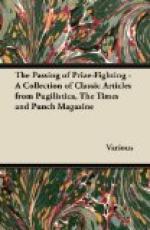Mr. PETO was alarmed by an alleged increase in the export of footwear to Switzerland, and particularly to villages on the German frontier. He yields to none in his desire to give the KAISER the boot, but not in any surreptitious manner. Lord WOLMER comforted him with the statement that the bulk of the exports consisted of women’s and children’s shoes, quite useless to the Germans until they get down to their 1930 class.
The HOME SECRETARY announced an increase in the War-bonus to the police from eight shillings to twelve shillings. With leather at its present price it was good to hear that the Government had been mindful of their extremities.
* * * * *
[Illustration: Coastguard (rung up by the Military). “NOT SO MUCH OF YER ’ACK! ACK! AND YER OLD ‘PIP EMMA!’ LET’S ‘AVE THE BLOOMIN’ MESSIGE.”]
* * * * *
THE YOUNGEST GENERATION.
“What shall he have that killed the deer?” someone asks somebody else in As You Like It. But there is a better question than that, and it is this—“What shall they have that preserve the little dears?” and the answer (if I can do anything to influence it) is—honour and support; for there can be no doubt that in these critical times, when the life of the best and bravest and strongest is so cheap, no duty is more important than the cherishing of infancy.
At a Creche in Notting Hill I watched, the other day, some of this cherishing in progress, and it was a pleasant and stimulating sight. The institution was in existence in a small way before the War, but it has recently been enlarged and made scientific, to meet the greater needs which the War has set up, and it is now able to act as foster mother to seventy mites, from the age of one month to four years, whose real mothers are for the most part engaged in war work. That is a good piece of citizenship, is it not? And to watch it in being is an education in those wonderful things to the eye of man—the solicitude and patience and capability of woman. The noise alone, whether of joy or of transitory grief, would drive most men frantic; but these devoted souls, knowing that it is all part of the game, proceed with an unearthly composure through it all—undressing their charges, dressing them, washing them, feeding them, beguiling them; in a word, tending them, from morning till evening.
The children begin to arrive, brought either by their mothers, their “Little Mothers” (I mean sisters) or their brothers, between 8 and 9—some in arms and some in perambulators and some in go-carts; and then they are immediately divested of their home clothes, popped into warm baths three or four at a time, and dressed in the clothes belonging to the Creche. For the rest of the day they wear these clothes and sleep, eat, play and, when it amuses them more to do so, cry, until the time comes to be put back into their own garments and be taken away. By some strange instinct their relations, I am informed, know them again, and very few mistakes occur; and so gradually, in the neighbourhood of seven o’clock, peace descends on this corner of Notting Hill once more.




